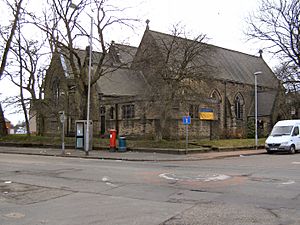Holy Trinity Church, Bury facts for kids
Quick facts for kids Holy Trinity Church, Bury |
|
|---|---|

Holy Trinity Church, Bury
|
|
| Lua error in Module:Location_map at line 420: attempt to index field 'wikibase' (a nil value). | |
| OS grid reference | SD 810,103 |
| Location | Bury, Greater Manchester |
| Country | England |
| Denomination | Anglican |
| History | |
| Status | Parish church |
| Architecture | |
| Functional status | Redundant |
| Heritage designation | Grade II |
| Designated | 23 October 2004 |
| Architect(s) | E. G. Paley |
| Architectural type | Church |
| Style | Gothic Revival |
| Completed | 1863 |
| Construction cost | £5,500 |
| Closed | 30 November 2010 |
| Specifications | |
| Capacity | 627 |
| Materials | Coursed rock-faced sandstone with ashlar dressings Welsh slate roofs |
| Administration | |
| Parish | Roch Valley |
| Deanery | Bury |
| Archdeaconry | Bolton |
| Diocese | Manchester |
| Province | York |
Holy Trinity Church is a special old building located on Spring Street in Bury, Greater Manchester, England. It used to be a busy Anglican parish church, but now it's considered a "redundant church." This means it's no longer used for regular church services.
The church is very important because it's listed as a Grade II building on the National Heritage List for England. This means it's a protected historical building.
Contents
History of Holy Trinity Church
When Was the Church Built?
Holy Trinity Church was built a long time ago, between 1863 and 1865. It cost about £5,500 to build back then. This was a lot of money at the time!
Who Designed the Church?
The church was designed by a famous architect named E. G. Paley. He was from Lancaster, a town not too far from Bury. His original plan for the church was even bigger. It included a south aisle and a tall tower with a spire, but these parts were never built.
Who Helped Build It?
The land for the church was given by the 14th Earl of Derby, Edward Smith-Stanley, 14th Earl of Derby. He also donated a large sum of £1,000 to help with the building costs. When it was finished, the church could seat 627 people.
Changes Over Time
Around 1920, the church was made a bit larger with an extension. An interesting fact is that Edward Hordern, who was the father of the well-known British actor Michael Hordern, used to be a rector (a type of priest) at this church.
What Happened to the Church?
On November 30, 2010, Holy Trinity Church was officially declared "redundant." This meant it was no longer needed for regular church services. Its parish (the area it served) was combined with two other churches in Bury.
In 2011, there were plans to sell the building. The idea was to turn it into a children's nursery and an early learning center. This would give the historic building a new purpose in the community.
Architecture and Design
What Is the Church Made Of?
Holy Trinity Church is built from strong, rough-cut sandstone. This stone is called "rock-faced sandstone." It also has smooth, cut stone details called "ashlar dressings." The roof is made of Welsh slate, which is a very durable material.
What Style Is It?
The church is built in the Gothic Revival style, specifically the Early English Gothic style. This style often features pointed arches and simple, strong designs.
How Is the Church Laid Out?
The church's design includes a main area called the nave, and a side section called a north aisle with a porch. It also has a chancel (the area around the altar) with a Lady chapel and a vestry (a room for the clergy) to the north.
Because of how the arches run down the middle, some experts describe it as a "double-naved church." This means it has two main sections side-by-side, with the chancel attached to the southern part. The windows at both ends of the church have special "plate tracery," which are stone patterns that hold the glass.
Inside, there are five arched sections supported by round pillars. Between the aisle and the Lady chapel, there are three more arched sections. In the Lady chapel, you can see a brightly painted reredos. This is a decorative screen behind the altar, and it was added in 1987 as a memorial for the First World War.
See also
- Listed buildings in Bury
- List of churches in Greater Manchester
- List of ecclesiastical works by E. G. Paley
 | Isaac Myers |
 | D. Hamilton Jackson |
 | A. Philip Randolph |

